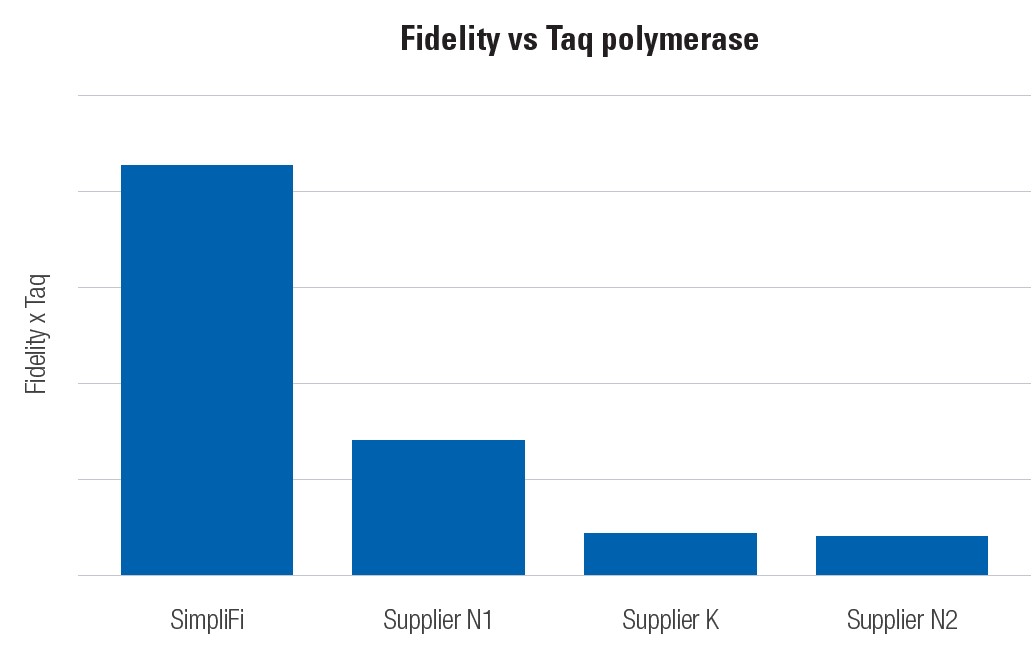Ordering
*link will take you to our exclusive distribution partner site
*link will take you to our exclusive distribution partner site
SimpliFi HS Mix is a combination of the latest advances in buffer chemistry and PCR enhancers and stabilizers, together with an aptamer-mediated hot-start polymerase, dNTPs and MgCl2. It has been designed for highly reproducible, accurate assay results in the presence of inhibitors. The advanced buffer chemistry and enhancers has been developed for fast PCR and is designed for superior sensitivity and specificity, making SimpliFi HS Mix perfect for NGS library amplification.

Fidelity comparison across commercially available high-fidelity polymerases.
The fidelity of the SimpliFi HS Mix was determined using a method designed by Lee D. et al. (Mapping DNA polymerase errors by single-molecule sequencing) using next generation sequencing and compared to other commercially available high-fidelity master mixes, using the same method. The results illustrate the higher fidelity (130x) of SimpliFi HS Mix.
GC bias with both high and low GC content
GC bias plot from whole-genome sequencing of a mixture of S. aureus and R. spheroides genomic DNA using SimpliFi HS Mix and a high fidelity mix from Supplier K. GC bias plots were generated, with %GC content of 100 bp windows on the X axis. Normalized coverage is indicated for the mixes and can be compared to a PCR-free reference library (representing unbiased coverage). The results illustrate SimpliFi HS Mix has a lower bias across the entire range of GC content, compared to the PCR-amplified library from supplier K, especially for GC percentages higher than 65%.
|
Reagent |
100 Reactions |
500 Reactions |
|
SimpliFi HS Mix |
2 x 1.25 mL |
10 x 1.25 mL |
All components should be stored at -20°C upon receipt for optimum stability. Repeated freeze/thaw cycles should be avoided.
When stored under the recommended conditions and handled correctly, full activity is retained until the expiry date indicated on the outer box label.
Shipped on Dry Ice or Blue Ice.
SimpliFi HS Mix has been validated for templates up to 5 kb.
| Observation | Recommended Solution(s) |
| No or low PCR yield | Enzyme concentration too low – increase the amount of enzyme in 0.5 U increments. |
| Primers degraded – check quality and age of the primers. | |
| Magnesium concentration too low – increase concentration in 0.25 mM increments with a starting concentration of 1.75 mM. | |
| Primer concentration not optimized. Titrate primer concentration (0.3-1 µM); ensuring that both primers have the same concentration. | |
| Template concentration too low – Increase concentration of template. | |
| Perform a positive control to ensure that the enzyme, dNTPs and buffers are not degraded and/or contaminated. | |
| Multiple Bands | Primer annealing temperature too low. Increase annealing temperature. Primer annealing should be at least 5°C below the calculated Tm of primers. |
| Prepare master mixes on ice or use a heat-activated polymerase. | |
| For problems with low specificity. Try adding 3% DMSO (not supplied) to improve specificity. | |
| Smearing or artifacts | Template concentration too high. Prepare serial dilutions of template. |
| Too many cycles. Reduce the cycle number by 3-5 to remove non-specific bands. | |
| Enzyme concentration too high - decrease the amount of enzyme in 0.5 U increments. | |
| Extension time too long. Reduce extension time in 0.5-1 minute increments. |
Please click here in order to request your sample. You will receive an email confirmation within two business days with delivery details.